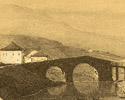19th Century´s militar history in the Basque Country
JOSE URANGA. (1788-1868)
 Born in Azpeitia in October 1788, Uranga studied until the French invasion led him to enlist as a volunteer with General May in Oviedo. He fought in Asturias and Galicia until he was destined to the Battalion of Volunteers of Gipuzkoa in 1811, where he faced the invaders under the orders of Jauregi "The Shepherd". He took part in diverse combats until the Battle of San Marcial in August 1813 for which he was decorated, as was his comrade-in-arms Tomás Zumalacárregui.
Born in Azpeitia in October 1788, Uranga studied until the French invasion led him to enlist as a volunteer with General May in Oviedo. He fought in Asturias and Galicia until he was destined to the Battalion of Volunteers of Gipuzkoa in 1811, where he faced the invaders under the orders of Jauregi "The Shepherd". He took part in diverse combats until the Battle of San Marcial in August 1813 for which he was decorated, as was his comrade-in-arms Tomás Zumalacárregui.
He continued with his military career up until April 1821, when he rebelled against the Liberal authorities in Salvatierra creating a division of 2,000 men to fight the government troops in Alava. At the end of this campaign, he was appointed colonel. Over subsequent years, he acted as the commanding general of the province of Alava.
In 1830, he commanded the column that fought against the expedition of Espoz Mina and Jauregi when they tried to restore Liberalism to Spain, defeating them and forcing them to flee to France.
 He was one of the first to proclaim Carlos V king on the death of his brother Ferdinand VII and organised diverse battalions in Alava. He joined Zumalacárregui and participated in the main actions at the start of his campaign, for which he was awarded the rank of field marshal. In July 1834, when Don Carlos entered the Basque Country, he named Uranga as his aide-de-camp in charge of his personal security.
He was one of the first to proclaim Carlos V king on the death of his brother Ferdinand VII and organised diverse battalions in Alava. He joined Zumalacárregui and participated in the main actions at the start of his campaign, for which he was awarded the rank of field marshal. In July 1834, when Don Carlos entered the Basque Country, he named Uranga as his aide-de-camp in charge of his personal security.
 The following year, he took part in the blockade of San Sebastián and took the Convent of San Bartolomé. During the Royal Expedition, Don Carlos appointed him Capitán General (governor general) of Navarre and the Basque provinces, i.e. the man in charge of Carlist territory while the bulk of the troops marched to Madrid. Despite his lack of men, he managed to take the Liberal garrisons of Lerín, Peñacerrada and Peralta and, more importantly, defeat O'Donell at Andoain.
The following year, he took part in the blockade of San Sebastián and took the Convent of San Bartolomé. During the Royal Expedition, Don Carlos appointed him Capitán General (governor general) of Navarre and the Basque provinces, i.e. the man in charge of Carlist territory while the bulk of the troops marched to Madrid. Despite his lack of men, he managed to take the Liberal garrisons of Lerín, Peñacerrada and Peralta and, more importantly, defeat O'Donell at Andoain.
He spent the last few years of the war with Don Carlos and sided with the apostólicos in internal struggles. After the shootings of Estella, he was exiled to France by Maroto. He lived in exile in France until the amnesty of 1848, after which he settled in Vitoria where he died in 1860.

